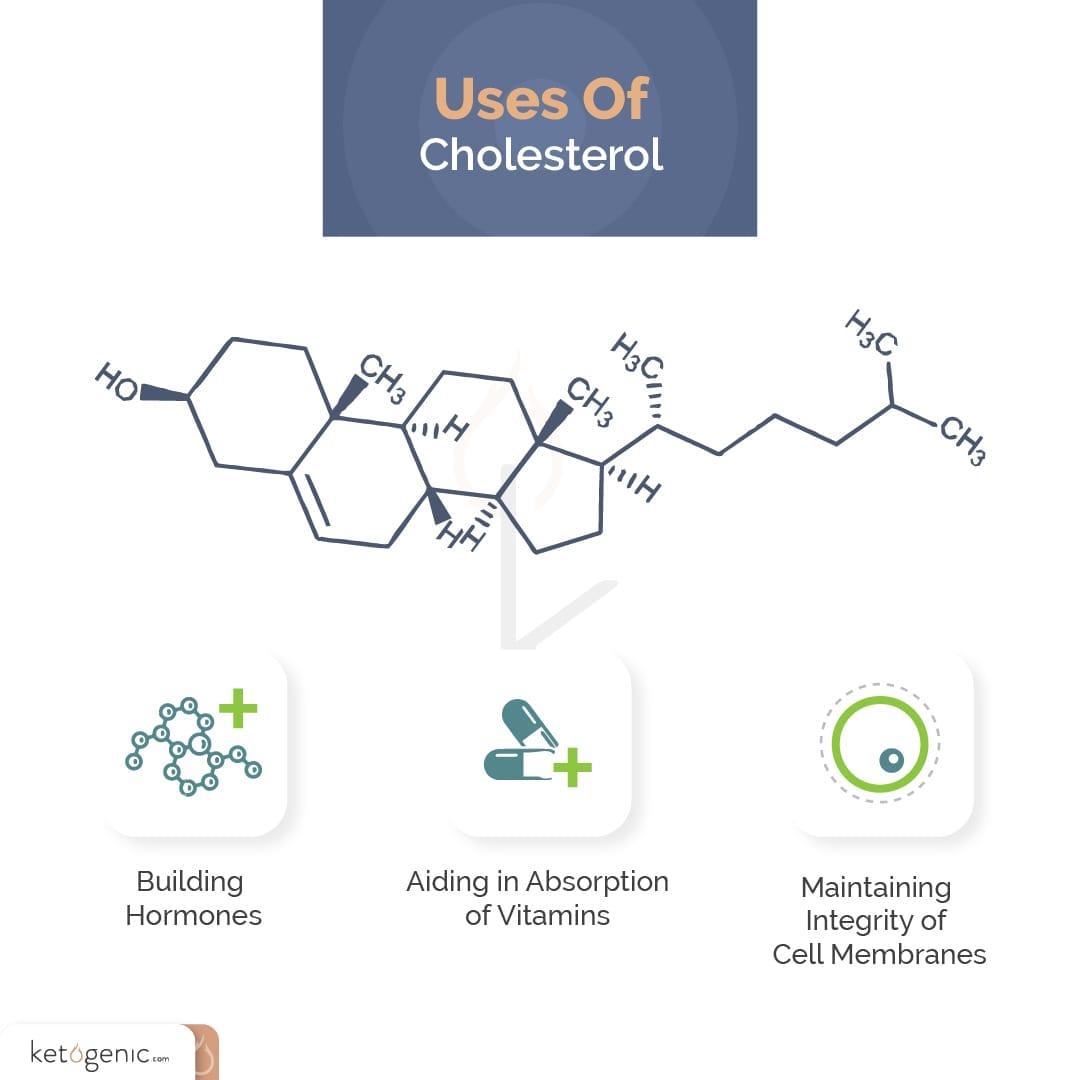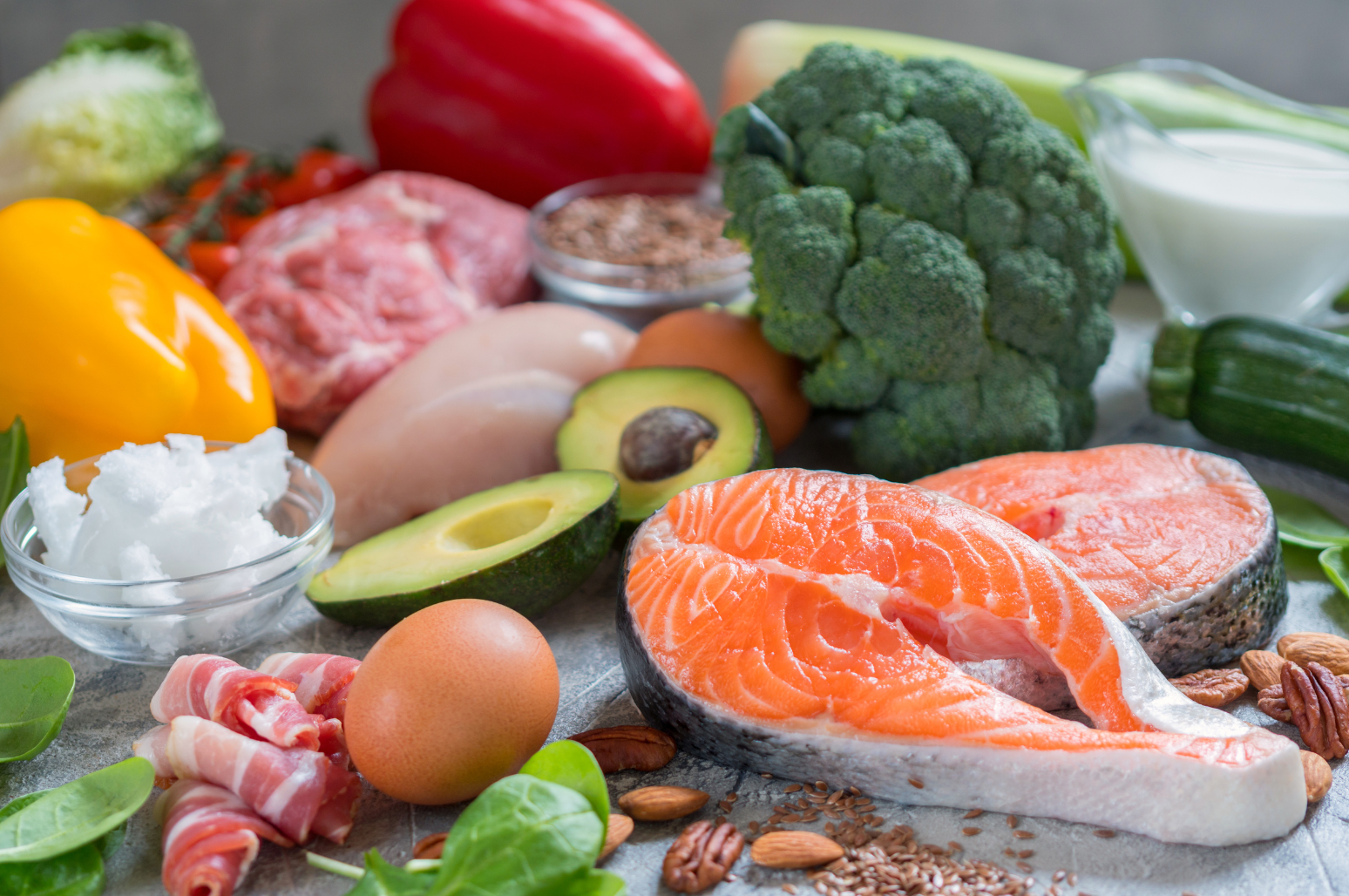High Cholesterol on Keto: What Does it Mean?

One of the biggest areas of misinformation about the ketogenic diet deals with cardiovascular health and cholesterol. So, what’s the deal with cholesterol? How does keto impact cholesterol and what should you do if you have high cholesterol on keto? In order to answer these questions, first, you just understand what cholesterol is and what purpose it serves.
What is Cholesterol?
Cholesterol is a waxy fat-like substance present in all your cells. Your body needs cholesterol to make vitamin D, hormones, certain substances to aid digestion, and more.
The research on cholesterol is still divided and ongoing. Many researchers believe cholesterol levels that are too high in general might be associated with health risks and play a role in heart disease. Other experts note that cholesterol might have a protective effect on the body [1].

Your body makes the cholesterol it needs, and cholesterol is also found in certain natural foods, such as egg yolks, red meat, organ meats, and dairy. Some research reveals that dietary cholesterol doesn’t significantly impact blood serum cholesterol levels. This means the cholesterol discussion is multi-faceted and goes way beyond the consumption of dietary cholesterol. Foods with higher dietary cholesterol content are typically natural whole foods that humans have eaten for thousands and even millions of years. Numerous experts believe these foods positively impact health and that other factors should be considered with regard to serum cholesterol [2].
What are the Different Types of Cholesterol?
It helps to understand the three main types of cholesterol or more specifically, lipoproteins that carry the lipids (fats) through your blood. The three types are HDL, LDL, and VLDL [3].
Since cholesterol doesn’t dissolve in water, it can’t travel through your blood on its own and needs to be transported through these lipoproteins — particles derived from fat and protein.
1) HDL
High-density lipoprotein is sometimes called the ‘good’ cholesterol because it transports cholesterol from other areas of your body back to your liver. Your liver then eliminates the cholesterol from your body.
2) LDL
Low-density lipoprotein mainly carries cholesterol and while some experts don’t believe this type of lipoprotein is a cause for concern, others sometimes call this the ‘bad’ cholesterol that might contribute to the risk of heart disease.
3) VLDL
Very low-density lipoprotein is often referred to as ‘bad’ cholesterol because research shows it can contribute to a buildup of plaque in the arteries. VLDL is different to LDL in many ways and is likely to be more of an underlying health concern. VLDL carries a different type of fat (lipid) called triglycerides through the body. Higher levels of triglycerides in your blood might increase your risk of heart disease, stroke, and heart attack. High triglycerides have also been linked to acute inflammation of the pancreas (pancreatitis).
Testing Your Cholesterol Levels
With a simple blood test, your doctor or health care practitioner can check your cholesterol levels, such as your important triglyceride levels. Cholesterol is used to build certain hormones and regenerate your cells, whereas triglycerides help store unused calories and give your body energy. Triglycerides are stored in your fat cells.
High cholesterol doesn’t present any symptoms, so you might not be aware of your cholesterol levels without a blood test.
What Does the Research Show About Keto and Cholesterol?
While there are specific medications and natural supplements that might help with cholesterol, such as statins or fish oil, making healthy dietary choices can also regulate your cholesterol levels and improve your general health.
Cholesterol levels are improved by losing excess body weight, avoiding or limiting sugar, refined carbohydrates, and trans fats, and choosing healthier natural fats, such as wild-caught fish.
Studies show the ketogenic diet and carbohydrate restriction increases the good HDL cholesterol and lowers overall high cholesterol levels. The outcome of some studies also showed lower body weight and a decrease in fasting blood sugar levels [4] [5].
The ketogenic diet has proven superior for improving cholesterol levels when compared to the low-fat diet [6].
In conclusion, going keto seems to regulate and improve cholesterol levels in addition to the plethora of other health benefits.
What Should You Do If Your Cholesterol Is Too High on Keto?
If you are following a well-formulated, ketogenic diet, your cholesterol levels should improve. However, if you find that this isn’t the case, and your cholesterol levels have increased, what should you do? Well, the first step is to make sure your cholesterol levels are actually being negatively affected. The total cholesterol, HDL, and LDL numbers provided by your doctor do not paint the full picture. If you are concerned about high cholesterol on keto, you should request an NMR LipoProfile test from your doctor. This type of blood test looks at more in-depth measurements like particle size and concentration. Particle size and concentration are better indicators of health when compared to general total levels.

What Should You Look For on An NMR LipoProfile Test?
Begin by looking at the LDL particle concentration and size. Research suggests that particle size is the most important factor to consider when looking at cardiovascular health (in relation to cholesterol levels). A smaller LDL particle size is correlated to a higher risk of atherosclerosis. [7] This means that you should be looking for larger particle sizes.
These more in-depth measurements will give you a better understanding of your cholesterol levels as compared to surface-level total levels.
Has Going Keto Helped Your Cholesterol?
How has the ketogenic diet improved your cholesterol and heart health?
References
U.S. National Library of Medicine. Cholesterol,
Mcgill, H. C. (1979) Relationship of dietary cholesterol to serum cholesterol concentration and to atherosclerosis in man. American Journal of Clinical Nutrition,
Mayo Clinic. (2018). Triglycerides: Why Do They Matter?
Dashti, H. M., Al-Zaid, N. S., Mathew, T. C., Al-Mousawi, M., Talib, H., Asfar, A. K., & Behbahani, A. I. (2006). Long term effects of ketogenic diet in obese subjects with high cholesterol level. Molecular and Cellular Biochemistry, 286(1),
Dashti, H. M., Bo-Abbas, Y. Y., Asfar, S. K., Mathew, T. C., Hussein, T., Behbahani, A., Khoursheed, M. A., Al-Sayer, H. M., & Al-Zaid, N. S. (2003). Ketogenic diet modifies the risk factors of heart disease in obese patients.Nutrition, 19(10), 901-902.
Yancy Jr, W. S., Olsen, M. K., Guyton, J. R., & Bakst, R. P. (2004). A low-carbohydrate, ketogenic diet versus a low-fat diet to treat obesity and hyperlipidemia. Annals of Internal Medicine,
Ivanova, E. A., Myasoedova, V. A., Melnichenko, A. A., Grechko, A. V., & Orekhov, A. N. (2017). Small Dense Low-Density Lipoprotein as Biomarker for Atherosclerotic Diseases. Oxidative medicine and cellular longevity, 2017, 1273042.









